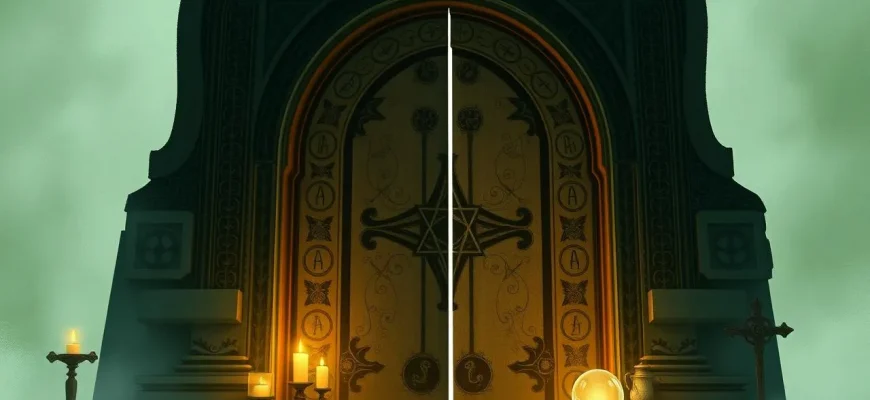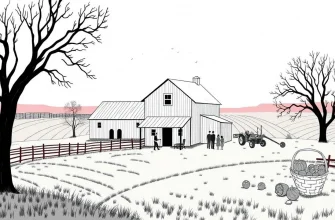Delving into the world of paganism through cinema offers a fascinating glimpse into ancient beliefs, rituals, and the clash between old and new. These films not only entertain but also educate, providing a rich tapestry of cultural exploration. Whether you're a history buff, a mythology enthusiast, or simply looking for a compelling story, this collection of pagan-themed dramas will captivate your imagination and perhaps even challenge your understanding of the world.

The Wicker Man (1973)
Description: This British horror film explores the dark side of paganism when a devout Christian policeman investigates the disappearance of a young girl on a remote Scottish island, only to find himself ensnared in a pagan ritual. It's a chilling examination of cultural clash and the power of belief.
Fact: The film was initially panned by critics but has since gained cult status. The original ending was lost, and the version released was not as intended by the director.
 Watch Now
Watch Now 
The Crucible (1996)
Description: While not directly about paganism, this film adaptation of Arthur Miller's play deals with the hysteria surrounding witchcraft in Salem, Massachusetts, reflecting the fear of pagan practices in a Puritan society.
Fact: The film was nominated for two Academy Awards, including Best Adapted Screenplay. It's based on real historical events but uses allegory to comment on McCarthyism.
 Watch Now
Watch Now 
The Wicker Tree (2011)
Description: A spiritual sequel to "The Wicker Man," this film follows two young American missionaries who travel to Scotland to convert pagans, only to find themselves in a modern-day pagan ritual. It's a dark comedy with a twist on the original's themes.
Fact: The film was directed by Robin Hardy, who also directed the original "The Wicker Man." It was intended as a thematic continuation rather than a direct sequel.
 Watch Now
Watch Now 
The Wicker Man (Remake) (2006)
Description: This remake of the 1973 classic follows a similar plot but with a modern twist. A policeman investigates the disappearance of a girl on an island with pagan traditions, leading to a shocking climax.
Fact: Despite its poor critical reception, the film has a cult following for its campy elements. It stars Nicolas Cage in one of his most memorable roles.
 Watch Now
Watch Now 
The Witch (2015)
Description: Set in 1630s New England, this film follows a family banished from their Puritan plantation, where they encounter the dark forces of witchcraft and paganism. It's a slow-burning, atmospheric tale that delves into the fear of the unknown and the supernatural.
Fact: The film uses authentic 17th-century English dialect for dialogue, making it a unique linguistic experience. It was also shot in natural light to enhance its eerie atmosphere.
 Watch Now
Watch Now 
The Pagan King (2018)
Description: This Latvian historical epic follows the life of Namay, a young pagan warrior who rises to become a king, fighting against Christian invaders. It's a visually stunning portrayal of pagan resistance.
Fact: The film was shot in Latvia and features authentic pagan rituals and costumes, providing a deep dive into Baltic pagan culture.
 Watch Now
Watch Now 
The Pagan Queen (2009)
Description: This Czech film tells the story of Libuše, a legendary pagan queen who leads her people in the face of Christian expansion. It's a tale of resistance, love, and the struggle between old and new religions.
Fact: The film was shot in the Czech Republic, using many historical locations to bring authenticity to the story. It also features a blend of historical drama and fantasy elements.
 Watch Now
Watch Now 
The Pagan (1929)
Description: This silent film tells the story of a half-caste boy in Tahiti who must choose between his pagan heritage and the Christian teachings of his missionary father. It's a poignant look at cultural identity and religious conflict.
Fact: The film was one of the last major silent films released before the advent of talkies. It was also one of the first films to be shot on location in Tahiti.
 30 Days Free
30 Days Free 
The Pagan (1936)
Description: Another film with the same title, this one follows a young man in the South Seas who must navigate his pagan upbringing with the Christian teachings of his adopted family, exploring themes of identity and faith.
Fact: The film was one of the first to use Technicolor, showcasing the vibrant landscapes of the South Pacific.
 30 Days Free
30 Days Free 
The Wicker Man (2011) (2011)
Description: This lesser-known adaptation of the original story focuses on the pagan rituals of a small Scottish island community, providing a fresh take on the classic tale of paganism versus Christianity.
Fact: This version was made for television and includes some changes to the plot to suit a different audience. It was directed by David Leland, known for his work on "Band of Brothers."
 30 Days Free
30 Days Free 








